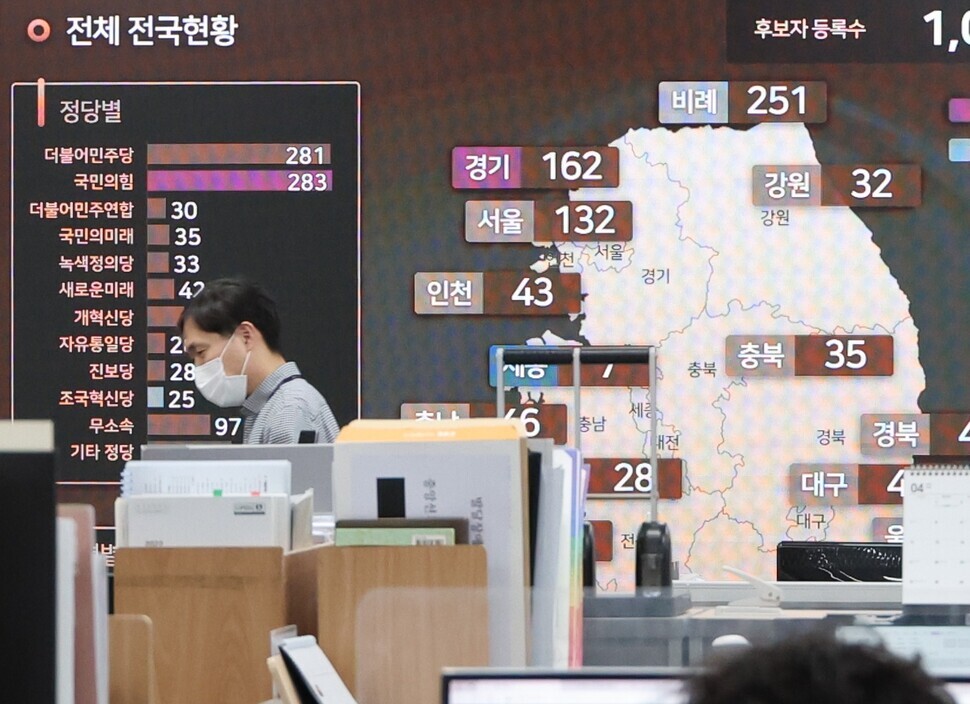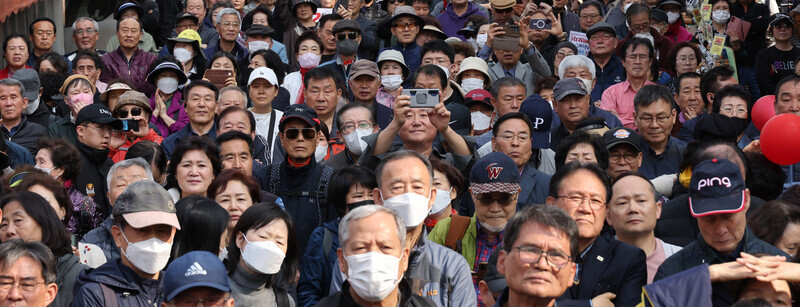hankyoreh
Links to other country sites 다른 나라 사이트 링크
‘Shy conservatives,’ young voters could determine Korea’s upcoming legislative elections

As the South Korean general election on April 10 approaches, there are differing opinions — both within and outside the political sphere — about the accuracy of predictions that the Democratic Party will attain a National Assembly majority. Regulations forbid the publication of poll and survey results in the six days leading up to the election. Those regulations kicked into gear on Thursday.
According to the Hankyoreh’s inquiries of political insiders and polling experts, there is a high chance that the Democratic Party will be able to exploit public dissatisfaction with the Yoon Suk-yeol administration to attain 150 or more seats — if they combine their district seats and proportional representation seats. However, considering the last-minute potential for conservatives to rally support and the controversy surrounding key Democratic candidates, there is no telling until the official results are out. Some experts agreed to comment on the condition of anonymity.
“It looks as if the Democratic Party will secure a comfortable majority in the National Assembly. There are questions about whether the People Power Party will even be able to attain 100 seats — as it did in the last general election — but if they lose even five seats in swing districts such as Busan, Ulsan, and South Gyeongsang, it will be difficult for them to secure even 100 seats,” said an insider at polling institute.
“Talk of the Democratic Party attaining 150 seats or more is not unfounded bluster. They have the potential to secure an additional 15 seats or more in highly contested districts [resulting in anywhere between 135 to 165 seats],” said an insider at another polling institute.
While it’s unlikely that the Democrats will attain the landslide 180 majority they got in the 2020 general election (163 district seats, 17 proportional representation seats), it looks like they’ll end up eking out a parliamentary majority. The People Power Party only managed 103 seats (84 district, 19 proportional) in the last general election.
Choi Byeong-cheon, who was previously involved in shaping policy for the Democratic Party, commented, “The will to pass judgment on the current administration has been triggered by the string of mistakes made by the government and the ruling party since March and the emergence of the Rebuilding Korea Party has gathered pan-opposition sentiments together.”
In the wake of the appointment and resignation of Lee Jong-sup as ambassador to Australia, the controversy over the remarks made by a presidential senior secretary about a 1988 stabbing of a journalist, unrest over inflation sparked by President Yoon Suk-yeol’s comments about vegetable prices, and drawn-out conflict between the administration and physicians, the Rebuilding Korea Party, with its “three years is too long” slogan, has added fuel to the thought that judgment must be served to the current administration.
On the other hand, Choi Chang-ryeol, a professor at Yong In University opined, “Issues concerning candidates Yang Moon-seok and Kim Jun-hyeok of the Democratic Party may affect moderates and put the Democratic Party at a disadvantage. With word spreading that the odds aren’t in the ruling party’s favor, PPP supporters may have been disinclined to respond to public surveys, which could explain how the survey results are on the side of the Democratic Party.”

While current survey results show the Democratic Party to be on top as they demonstrate the public’s urge to pass judgment on the current administration, the PPP may receive rallying support from groups such as “shy” conservatives.
Jang Deok-hyun, the chief of Gallup Korea’s planning and research department, said, “Across generations, there’s a basic consensus that that this election should be used to teach the administration a lesson. If we see a large turnout among young people in their 20s and 30s, who rarely frequented polling stations, the opposition party may come out victorious.”
At the same time, Jang said, “there is always the possibility that this won’t be the case, so we’ll have to wait and see.”
Some have warned that opinion polls shouldn’t be taken as gospel. An official of a research company stated that it’s “difficult to make definitive conclusions about the general election” based on current polling.
The reason is that public polling for the general election relies on samples of 500 people, putting the margin of error at plus or minus 4.4 percentage points, or a range of 8.8 points.
Suppose Candidate A saw 32.1% in the polls, while Candidate B earned 40.9% support. Statistically speaking, these should be interpreted as equal, as they fall within the margin of error, but higher voter turnout could produce different results.
Out of all 254 electoral districts across the country holding elections next week, 80 — or over 30% — had not carried out even a single poll. That included around 40 districts in the greater Seoul area, which are often won by the thinnest of margins.
By Ko Han-sol, staff reporter; Noh Ji-won, staff reporter; Lee Woo-yun, staff reporter
Please direct questions or comments to [english@hani.co.kr]

Editorial・opinion
![[Guest essay] Maybe Korea’s rapid population decline is an opportunity, not a crisis [Guest essay] Maybe Korea’s rapid population decline is an opportunity, not a crisis](https://flexible.img.hani.co.kr/flexible/normal/500/300/imgdb/original/2024/0430/9417144634983596.jpg) [Guest essay] Maybe Korea’s rapid population decline is an opportunity, not a crisis
[Guest essay] Maybe Korea’s rapid population decline is an opportunity, not a crisis![[Column] Can Yoon steer diplomacy with Russia, China back on track? [Column] Can Yoon steer diplomacy with Russia, China back on track?](https://flexible.img.hani.co.kr/flexible/normal/500/300/imgdb/original/2024/0430/1617144616798244.jpg) [Column] Can Yoon steer diplomacy with Russia, China back on track?
[Column] Can Yoon steer diplomacy with Russia, China back on track?- [Column] Season 2 of special prosecutor probe may be coming to Korea soon
- [Column] Park Geun-hye déjà vu in Yoon Suk-yeol
- [Editorial] New weight of N. Korea’s nuclear threats makes dialogue all the more urgent
- [Guest essay] The real reason Korea’s new right wants to dub Rhee a founding father
- [Column] ‘Choson’: Is it time we start referring to N. Korea in its own terms?
- [Editorial] Japan’s rewriting of history with Korea has gone too far
- [Column] The president’s questionable capacity for dialogue
- [Column] Are chaebol firms just pizza pies for families to divvy up as they please?
Most viewed articles
- 1‘We must say no’: Seoul defense chief on Korean, USFK involvement in hypothetical Taiwan crisis
- 2After election rout, Yoon’s left with 3 choices for dealing with the opposition
- 3Why Kim Jong-un is scrapping the term ‘Day of the Sun’ and toning down fanfare for predecessors
- 4Two factors that’ll decide if Korea’s economy keeps on its upward trend
- 5Noting shared ‘values,’ Korea hints at passport-free travel with Japan
- 6AI is catching up with humans at a ‘shocking’ rate
- 7[Correspondent’s column] The US and the end of Japanese pacifism
- 8A week of protests lays bare many inherent vices of Korean health care system
- 9[Editorial] As it bolsters its alliance with US, Japan must be accountable for past
- 10[Editorial] Japan’s rewriting of history with Korea has gone too far